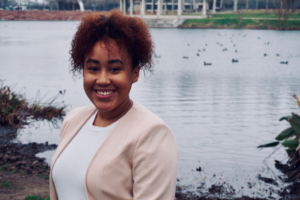“By sitting down to speak with parents and capturing their narratives,” Lauren Smith says, “we can gain a richer understanding of how we can better engage this demographic of parents in intervention.”
 Every year, the Hogg Foundation gives the Frances Fowler Wallace Memorial Award for Mental Health Dissertation Research to eligible doctoral candidates at institutions of higher education in Texas. Awardees receive a $1,500 scholarship to help cover research-related expenses.
Every year, the Hogg Foundation gives the Frances Fowler Wallace Memorial Award for Mental Health Dissertation Research to eligible doctoral candidates at institutions of higher education in Texas. Awardees receive a $1,500 scholarship to help cover research-related expenses.
One of our 2018 recipients, Lauren Smith, is a student in the School Psychology program at The University of Texas at Austin’s College of Education. Smith’s research investigates the effectiveness of school-based mHealth (mobile, or text message-based, health) intervention in engaging parents of underserved ethnic minority youths, who count for more than 50 percent of Texas’s public-school population. An mHealth approach that doesn’t support parental engagement is a missed opportunity for low-income minority parents in need of quality care for their children.
Educators and mental health professionals seeking to develop adaptive mHealth interventions have much to gain from Smith’s study, “Identifying Factors of Parent Engagement in a School-based Mental Health Intervention: An mHealth Approach.” We recently talked with Smith about the aims, methods, and contexts of her research project:
Hogg Foundation: Tell us about yourself. At what point did you decide to pursue a doctorate and career in social psychology, and what influenced that decision?
Lauren Smith: The decision followed my numerous applied experiences working with underserved populations in their communities—as an early childhood educator, volunteer and an undergraduate psychology student and research assistant. These opportunities motivated my desire to further a career in clinical therapeutic intervention. I discovered I had an affinity for working with children and quickly learned that school psychology programs would afford the exposure I wanted to work with children, adolescents and their families.
Hogg Foundation: What led you to take a professional interest in the topic of mHealth?
Smith: I have always had a keen interest in community-based research, with a focus on culturally appropriate and empirically supported interventions. In cultivating this interest, I became deeply invested in receiving feedback from individuals in the community on concerns involving them (e.g. bridging the gap between access and need)—so much so that I used my master’s thesis to collect feedback from community providers. After seeing results of this community participatory methodological approach, I quickly realized that a bigger way to address a number of barriers to care is to help minority parents feel more empowered in their children’s mental health.
Hogg Foundation: What questions are you trying to answer with this research?
Smith: The primary question I am looking to answer through this research is how we, as a field of psychology, have progressed in addressing historical barriers to low-income and ethnic minority parental involvement in children’s mental health—and how we, as psychologists, can continue to encourage parents to be more engaged in their child’s mental health care and well-being.
Hogg Foundation: How do you think your research methods and approach will help you answer the questions you’re posing?
Smith: Because quantitative data alone does not allow for further interpretation of results, I believe the biggest strength of my research methodology is the follow-up interviews with parents. By sitting down to speak with parents and capturing their narratives, we can gain a richer understanding of how we can better engage this demographic of parents in intervention.
Hogg Foundation: What, from your perspective, is the biggest area of need—or the greatest opportunity—related to this topic? In other words, how could we really move the needle on this front?
Smith: In order for the field to fill qualitative gaps in the literature, researchers have to become more detached from working solely within a controlled setting and more willing to interface with their communities of interest. They should use those opportunities to gather narratives from the community to better understand how proposed changes in the field of mental health have been helpful or possibly detrimental, and make changes accordingly.
Hogg Foundation: Can you suggest a few readings/resources for those who are interested in learning more about this topic?
Smith: A few readings that I believe would serve as a starting point are:
- Resources on prevalence, youth.gov
- Racial and ethnic disparities in pediatric mental health, Alegria, M., Vallas, M., & Pumariega, A. J.
- Improving and Standardizing Evaluation Reports of Web-based and Mobile Health Interventions, Eysenbach G, CONSORT-EHEALTH Group
- Initial engagement in parent-centered preventive interventions: A family systems perspective, Perrino, T., Coatsworth, J. D., Briones, E., Pantin, H., & Szapocznik, J.
- Parent perspectives from participating in a family component for CBITS: Acceptability of a culturally informed school-based program, Santiago, C. D., Fuller, A. K., Lennon, J. M., & Kataoka, S. H
